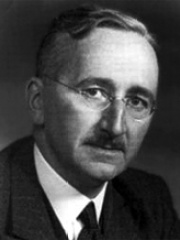
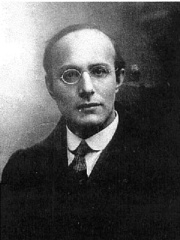
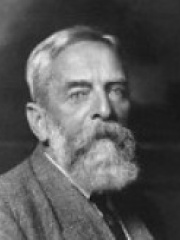
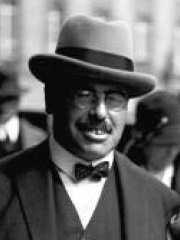
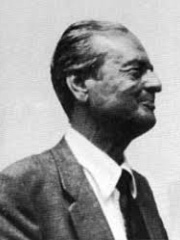


The Most Famous
ECONOMISTS from Austria
This page contains a list of the greatest Austrian Economists. The pantheon dataset contains 414 Economists, 8 of which were born in Austria. This makes Austria the birth place of the 10th most number of Economists behind Canada, and India.
Top 8
The following people are considered by Pantheon to be the most legendary Austrian Economists of all time. This list of famous Austrian Economists is sorted by HPI (Historical Popularity Index), a metric that aggregates information on a biography's online popularity.

1. Friedrich Hayek (1899 - 1992)
With an HPI of 78.84, Friedrich Hayek is the most famous Austrian Economist. His biography has been translated into 82 different languages on wikipedia.
Friedrich August von Hayek (8 May 1899 – 23 March 1992) was an Austrian-born British economist and philosopher. He is known for his contributions to political economy, political philosophy and intellectual history. Hayek shared the 1974 Nobel Memorial Prize in Economic Sciences with Gunnar Myrdal for work on money and economic fluctuations, and the interdependence of economic, social and institutional phenomena. His account of how prices communicate information is widely regarded as an important contribution to economics that led to him receiving the prize. He was a major contributor to the Austrian school of economics. During his teenage years, Hayek fought in World War I. He later said this experience, coupled with his desire to help avoid the mistakes that led to the war, drew him into economics. He earned doctoral degrees in law in 1921 and political studies in 1923 from the University of Vienna. He subsequently lived and worked in Austria, Great Britain, the United States and Germany. He became a British national in 1938. He studied and taught at the London School of Economics and later at the University of Chicago, before returning to Europe late in life to teach at the Universities of Salzburg and Freiburg. Hayek had considerable influence on a variety of political and economic movements of the 20th century, and his ideas continue to influence thinkers from a variety of political and economic backgrounds today. Although sometimes described as a conservative, Hayek himself was uncomfortable with this label and preferred to be thought of as a classical liberal or libertarian. His most popular work, The Road to Serfdom (1944), has been republished many times over the eight decades since its original publication. Hayek was appointed a Member of the Order of the Companions of Honour in 1984 for his academic contributions to economics. He was the first recipient of the Hanns Martin Schleyer Prize in 1984. He also received the Presidential Medal of Freedom in 1991 from President George H. W. Bush. In 2011, his article "The Use of Knowledge in Society" was selected as one of the top 20 articles published in the American Economic Review during its first 100 years.

2. Karl Polanyi (1886 - 1964)
With an HPI of 70.44, Karl Polanyi is the 2nd most famous Austrian Economist. His biography has been translated into 40 different languages.
Karl Paul Polanyi (; Hungarian: Polányi Károly [ˈpolaːɲi ˈkaːroj]; 25 October 1886 – 23 April 1964) was an Austro-Hungarian economic historian, economic sociologist, and politician, best known for his book The Great Transformation, which questions the conceptual validity of self-regulating markets. In his writings, Polanyi advances the concept of the Double Movement, which refers to the dialectical process of marketization and push for social protection against that marketization. He argues that market-based societies in modern Europe were not inevitable but historically contingent. Polanyi is remembered best as the originator of substantivism, a cultural version of economics, which emphasizes the way economies are embedded in society and culture. This opinion is counter to mainstream economics but is popular in anthropology, economic history, economic sociology and political science. Polanyi's approach to the ancient economies has been applied to a variety of cases, such as Pre-Columbian America and ancient Mesopotamia, although its utility to the study of ancient societies in general has been questioned. Polanyi's The Great Transformation became a model for historical sociology. His theories eventually became the foundation for the economic democracy movement. Polanyi was active in politics, and helped found the National Citizens' Radical Party in 1914, serving as its secretary. He fled Hungary for Vienna in 1919 when the right-wing authoritarian regime of Admiral Horthy seized power. He fled Vienna for London in 1933 when Adolf Hitler came to power in Germany and fascism was on the ascendancy in Austria. After years of unsuccessfully seeking employment at universities in the United Kingdom, he moved to the United States in 1940 where he joined the faculty at Bennington College and later taught at Columbia University.

3. Friedrich von Wieser (1851 - 1926)
With an HPI of 66.92, Friedrich von Wieser is the 3rd most famous Austrian Economist. His biography has been translated into 36 different languages.
Friedrich von Wieser (German: [fɔn ˈviːzɐ]; 10 July 1851 – 22 July 1926) was an early (so-called "first generation") economist of the Austrian School of economics. Born in Vienna, the son of Privy Councillor Leopold von Wieser, a high official in the war ministry, he first trained in sociology and law. In 1872, the year he took his degree, he encountered Austrian-school founder Carl Menger's Grundsätze and switched his interest to economic theory. Wieser held posts at the universities of Vienna and Prague until succeeding Menger in Vienna in 1903, where along with his brother-in-law Eugen von Böhm-Bawerk he shaped the next generation of Austrian economists including Ludwig von Mises, Friedrich Hayek and Joseph Schumpeter in the late 1890s and early 20th century. He was the Austrian Minister of Commerce from August 30, 1917, to November 11, 1918. Wieser is renowned for two main works, Natural Value, which carefully details the alternative-cost doctrine and the theory of imputation; and his Social Economics (1914), an ambitious attempt to apply it to the real world. His explanation of marginal utility theory was decisive, at least terminologically. It was his term Grenznutzen (building on von Thünen's Grenzkosten) that developed into the standard term "marginal utility", not William Stanley Jevons's "final degree of utility" or Menger's "value". His use of the modifier "natural" indicates that he regarded value as a "natural category" that would pertain to any society, no matter what institutions of property had been established. The economic calculation debate started with his notion of the paramount importance of accurate calculation to economic efficiency. Above all, to him prices represented information about market conditions and are thus necessary for any sort of economic activity. Therefore, a socialist economy would require a price system in order to operate. He also stressed the importance of the entrepreneur to economic change, which he saw as being brought about by "the heroic intervention of individual men who appear as leaders toward new economic shores". This idea of leadership was later taken up by Joseph Schumpeter in his treatment of economic innovation. Unlike most other Austrian School economists, Wieser rejected classical liberalism, writing that "freedom has to be superseded by a system of order". This vision and his general solution to the role of the individual in history is best expressed in his final book The Law of Power, a sociological examination of political order published in his last year of life.

4. Rudolf Hilferding (1877 - 1941)
With an HPI of 65.92, Rudolf Hilferding is the 4th most famous Austrian Economist. His biography has been translated into 32 different languages.
Rudolf Hilferding (German: [ˈhɪlfɐdɪŋ]; 10 August 1877 – 11 February 1941) was an Austrian-born Marxist economist, socialist theorist, politician and the chief theoretician for the Social Democratic Party of Germany (SPD) during the Weimar Republic, being almost universally recognized as the SPD's foremost theoretician of the twentieth century. He was also a physician. He was born in Vienna, where he received a doctorate having studied medicine. After becoming a leading journalist for the SPD, he participated in the November Revolution in Germany and was Finance Minister of Germany in 1923 and from 1928 to 1929. In 1933 he fled into exile, living in Zurich and then Paris, where he died in custody of the Gestapo in 1941. Hilferding was a proponent of the "economic" reading of Karl Marx, identifying with the "Austro-Marxian" group. He was the first to put forward the theory of organized capitalism. He was the main defender of Marxism from critiques by Austrian School economist and fellow Vienna resident Eugen von Böhm-Bawerk. Hilferding also participated in the "Crises Debate" – disputing Marx's theory of the instability and eventual breakdown of capitalism on the basis that the concentration of capital is actually stabilizing. He edited leading publications such as Vorwärts, Die Freiheit, and Die Gesellschaft. His most famous work was Das Finanzkapital (Finance capital), one of the most influential and original contributions to Marxian economics with substantial influence on Marxist writers such as Vladimir Lenin and Nikolai Bukharin influencing his writings on imperialism.

5. Fritz Machlup (1902 - 1983)
With an HPI of 61.18, Fritz Machlup is the 5th most famous Austrian Economist. His biography has been translated into 21 different languages.
Fritz Machlup (; German: [ˈmaxluːp]; born Friedrich Eduard Machlup; December 15, 1902 – January 30, 1983) was an Austrian-American economist known for his work in information economics. He was President of the International Economic Association from 1971 to 1974. He was one of the first economists to examine knowledge as an economic resource, and is credited with popularising the concept of the information society.

6. Bruno de Finetti (1906 - 1985)
With an HPI of 56.55, Bruno de Finetti is the 6th most famous Austrian Economist. His biography has been translated into 17 different languages.
Bruno de Finetti (13 June 1906 – 20 July 1985) was an Italian probabilist statistician and actuary, noted for the "operational subjective" conception of probability. The classic exposition of his distinctive theory is the 1937 "La prévision: ses lois logiques, ses sources subjectives", which discussed probability founded on the coherence of betting odds and the consequences of exchangeability.

7. Käthe Leichter (1895 - 1942)
With an HPI of 54.53, Käthe Leichter is the 7th most famous Austrian Economist. Her biography has been translated into 18 different languages.
Marianne Katharina "Käthe" Leichter (20 August 1895 in Vienna, Austria – February 1942) was an Austrian Jewish economist, women's rights activist, journalist and politician. She was a member of the Social Democratic Party of Austria and the Viennese Labour Chamber. She was detained in Ravensbrück concentration camp during the Nazi regime and killed by gas at the Bernburg Euthanasia Centre in 1942.

8. Gottfried Haberler (1900 - 1995)
With an HPI of 53.53, Gottfried Haberler is the 8th most famous Austrian Economist. His biography has been translated into 17 different languages.
Gottfried Haberler (Austrian German: [ˈhaːbɐlɐ]; July 20, 1900 – May 6, 1995; until 1919 Gottfried von Haberler) was an Austrian-American economist. He worked in particular on international trade. One of his major contributions was reformulating the Ricardian idea of comparative advantage in a neoclassical framework, abandoning the labor theory of value for an opportunity cost concept.
People
Pantheon has 8 people classified as Austrian economists born between 1851 and 1906. Of these 8, none of them are still alive today. The most famous deceased Austrian economists include Friedrich Hayek, Karl Polanyi, and Friedrich von Wieser.
Deceased Austrian Economists
Go to all RankingsFriedrich Hayek
1899 - 1992
HPI: 78.84
Karl Polanyi
1886 - 1964
HPI: 70.44
Friedrich von Wieser
1851 - 1926
HPI: 66.92
Rudolf Hilferding
1877 - 1941
HPI: 65.92
Fritz Machlup
1902 - 1983
HPI: 61.18
Bruno de Finetti
1906 - 1985
HPI: 56.55
Käthe Leichter
1895 - 1942
HPI: 54.53
Gottfried Haberler
1900 - 1995
HPI: 53.53
Overlapping Lives
Which Economists were alive at the same time? This visualization shows the lifespans of the 8 most globally memorable Economists since 1700.

